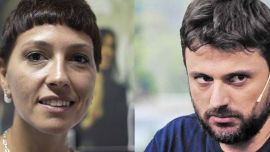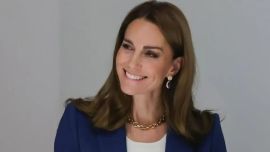If on his 1999 visit to Argentina, Prince Charles apologised to local schoolchildren for speaking to them in English by saying: “You wouldn’t want to hear my Spanish.” This columnist cannot claim to improve (or is “improvise” the right word?) too much on his pronunciation despite four decades in this country and a vastly expanded vocabulary in that period. Wading into the media lynching of Foreign Minister Santiago Cafiero for his linguistic malfeasance, misfeasance and nonfeasance in the Persian Gulf would thus be a classic case of throwing stones from a glass house on my part, were it not for my objections running along altogether different lines.
Those objections do not lie in his pronunciation or even the errors of content – there is a huge difference in this country’s image abroad between Argentina “improving” and “improvising” its capacity for growth. Nor do they lie in Cafiero calling the journalist Jorge Lanata a “dickhead” – for somebody whose Sunday evening television programme invariably concludes with a “Boludo de la semana” spot (will we see it being renamed with the D-word when the programme returns this year?), Lanata is being remarkably thin-skinned, a pot calling the kettle black. No, the critique extends way beyond the wretched minister (the fault for the error-strewn power point in Dubai lies with his support staff, not Cafiero) to a devalued civil service in general and to the Alberto Fernández Presidency in particular for naming two foreign ministers running who not only lack the formal qualifications for the post but had never previously shown any interest in international relations – once might be a misfortune but twice looks like carelessness, in the words of Oscar Wilde.
Cafiero’s disqualification should not be dated from his recent mishaps but from the start of his ministry six months ago when the Cabinet reshuffle following PASO primary defeat led to his being bounced from his comfort zone as Cabinet chief to be given the consolation prize of the Foreign Ministry at the expense of Felipe Solá, who boarded a flight to a regional summit in Mexico as a minister and descended from the aircraft as an ex-minister. Rumours that Cafiero has yet to make the transition between the two posts would seem to be vindicated by Jorge Fontevecchia’s interview with him, published in this newspaper on January 15. In the course of three pages Cafiero could not be shifted from domestic politics to what is supposed to be his current job except for a mention of Mercosur where he seemed to be labouring under the misconception that Alberto Fernández had repaired the damage allegedly done to the trade bloc by Mauricio Macri instead of opposing the attempts to relax protectionism by his Brazilian and Uruguayan colleagues – Cafiero did not even show signs of having a clear idea of what Jair Bolsonaro represents. In short, Caf is to international relations what decaf is to coffee.
In a journalistic career stretching back to 1983, my experience of previous foreign ministers does not include a Nobel Peace Prize (won by Carlos Saavedra Lamas in 1936 for ending the 1932-1935 Chaco War between Bolivia and Paraguay) but the last couple of years represent a new low.
My first minister was Juan Ramón Aguirre Lanari at the tail end of the 1976-1983 dictatorship – a military lackey recruited from an ultra-conservative elite but with an undeniable interest in external affairs as a seminal figure in the Argentine Council for International Relations (CARI. in its Spanish acronym). Dante Caputo ran the Ministry for all but the last two months of the 1983-1989 Raúl Alfonsín presidency – a political scientist rather than a professional diplomat but with a Sorbonne doctorate and sufficient international presence to head the 1988-1989 United Nations General Assembly. Those last two months of the Radical presidency were filled by Argentina’s first female foreign minister, Susana Ruiz Cerruti, with two decades of foreign service under her belt.
Carlos Menem’s first pick for the Foreign Ministry in 1989, the obsessive economist Domingo Cavallo, had no such formal qualifications as a former Central Bank governor (at the age of 35) but he certainly brought brainpower to the job, while his Harvard doctorate gave him a somewhat superior command of English to Cafiero. When Cavallo moved to the Economy Ministry to mastermind convertibility in 1991, he was replaced by Argentina’s longest-serving foreign minister since 1852 (Felipe Arana had charge of the often tense relations with the outside world in the last 17 years of the Rosas regime) – Guido Di Tella for almost nine years between early 1991 and late 1999. Again no formal qualifications as an engineering graduate but an academic and cultural powerhouse (Di Tella University and Institute) and comfortable with English from his MIT and Oxford years.
The evasion of the diplomatic service to head the Foreign Ministry continued during the 1999-2001 Alliance administration with the ex-paratrooper and economist Adalberto Rodríguez Giavarini but his intense work with CARI since attests to his interest in international relations. Two ex-governors then covered the gap between the Alliance and Kirchnerism – José María Vernet (Santa Fe) and Carlos Ruckauf (Buenos Aires) with Eduardo Duhalde.
The first Foreign Minister of Kirchnerism was the lawyer Rafael Bielsa (2003-2005) – again not a natural-born diplomat (as his current performance as Ambassador to Chile has perhaps shown) but one of an extremely talented trio of siblings. The rest of the Kirchner years were covered by two ministers with half a decade each – Jorge Taiana (2005-2010) and the late Héctor Timerman (2010-2015). Taina was the first minister since 1989 with a solid diplomatic background and it might be a very good question why he is Defence, not Foreign minister today. Timerman was the product of a press dynasty who used human rights militancy to get on the right side of Cristina Fernández de Kirchner and reach the ministry via the Washington Embassy – his 2013 memorandum of understanding with Iran remains controversial to this day.
The centre-right Macri administration was nevertheless unconventional in its choice of ministers with a woman and a gay – Susana Malcorra (world-class as previously the United Nations Cabinet chief) and the somewhat colourless but completely professional Jorge Faurie. Which takes us up to Solá and Cafiero.
So could a minister be worse than Cafiero? Well, yes – shortcomings galore but at least he does not have any pacts with Iran to his name and far less any role in the invasion of Ukraine, like the Kremlin’s Sergei Lavrov.























Comments